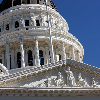Senate Bill 1439 Expands Certain Prohibitions of Accepting Campaign Contributions from Persons or Entities with Business Before a Public Agency

Number 56
The Political Reform Act of 1974 (PRA) prohibits government officials from soliciting or accepting campaign contributions of more than $250 from persons with a proceeding for a license, permit, or other entitlement pending before the agency, if the officer knows or has reason to know that the donor has a financial interest in the proceeding. The existing prohibition applies 12 months before and extends for three months after the final decision is rendered in the proceeding. However, local government entities whose officials were directly elected by the voters were exempted from this prohibition.
Senate Bill (SB) 1439, signed into law by the Governor on September 29, 2022, extends the prohibition on soliciting or accepting such campaign contributions to all local government officials, including elected officials (such as councilmembers and governing board members). SB 1439 also extends the prohibition period after the proceeding has concluded from three months to 12 months. Under the expanded rules, if an official receives a contribution over $250 from a person whose business comes before the agency within 12 months after the contribution, the official who received the contribution must disclose it publicly during the proceeding on the donor’s business, and must refrain from participating in or attempting to influence the outcome of the proceeding.
SB 1439 also creates two safe harbor periods which allow the official to cure a violation. The first provides that if an officer receives a contribution which would otherwise require disqualification but returns the contribution within 30 days from the time the officer knows, or should have known, about the contribution and the proceeding involving a license, permit, or other entitlement for use, the officer shall be permitted to participate in the proceeding. The second safe harbor provides that for elected officials who unknowingly violate the contribution prohibition they may return the contributions within 14 days of acceptance, provided that the official or their controlled committee must maintain records of curing the violation. The option to cure the acceptance of a prohibited contribution does not apply to elected officials who actually knew the contribution was prohibited at the time of acceptance.
California Common Cause, one of the main supporters of SB 1439, cited numerous examples of local elected officials, particularly city council members, receiving significant campaign contributions from individuals and firms with business before the local agency as justification for the need for expanding these prohibitions.
The Fair Political Practices Commission (FPPC) has recently indicated it will interpret the changes made by SB 1439, which goes into effect on January 1, 2023, not to apply retroactively. Accordingly, contributions made to officials prior to January 1, 2023 would not affect whether that official can decide on a proceeding. The FPPC is expected to adopt a formal opinion regarding this interpretation in late December 2022.
Takeaways
Elected officials must maintain vigilance in soliciting or accepting campaign contributions from persons who may have business coming before the official’s agency. Accepting such contributions may violate the PRA and could subject the official to fines or criminal penalties. If an official unknowingly accepts a prohibited contribution and later becomes aware of the contribution’s illegality, the official may cure the violation, but must do so in the prescribed time and maintain appropriate records.
If you have any questions about SB 1439, campaign contribution limits, or conflict of interest issues in general, please contact the author of this Client News Brief or an attorney at one of our eight offices located statewide. You can also subscribe to our podcast, follow us on Facebook, Twitter and LinkedIn or download our mobile app.
Disclaimer: As the information contained herein is necessarily general, its application to a particular set of facts and circumstances may vary. For this reason, this News Brief does not constitute legal advice. We recommend that you consult with your counsel prior to acting on the information contained herein.







